- Utility Menu

44d3fa3df9f06a3117ed3d2ad6c71ecc
- Administration
- PhD Program
The Ph.D. Program in the Department of Economics at Harvard is addressed to students of high promise who wish to prepare themselves in teaching and research in academia or for responsible positions in government, research organizations, or business enterprises. Students are expected to devote themselves full-time to their programs of study.
The program prepares students for productive and stimulating careers as economists. Courses and seminars offered by the department foster an intellectually active and stimulating environment. Each week, the department sponsors more than 15 different seminars on such topics as environmental economics, economic growth and development, monetary and fiscal policy, international economics, industrial organization, law and economics, behavioral economics, labor economics, and economic history. Top scholars from both domestic and international communities are often invited speakers at the seminars. The Harvard community outside of the department functions as a strong and diverse resource. Students in the department are free to pursue research interests with scholars throughout the University. Faculty of the Harvard Law School, Kennedy School of Government, and Harvard Business School, for example, are available to students for consultation, instruction, and research guidance. As a member of the Harvard community, students in the department can register for courses in the various schools and have access to the enormous library resources available through the University. There are over 90 separate library units at Harvard, with the total collections of books and pamphlets numbering over 13 million. Both the department and the wider University draw some of the brightest students from around the world, which makes for a student body that is culturally diverse and likely unequaled in the range of intellectual interests of its members. These factors combine to add an important dimension to the educational process. Students are able to learn from one another, collaborate on research projects and publications, and form bonds that are not broken by distance once the degree is completed and professional responsibilities lead them in different directions.
- Program Requirements
- Job Placement
- Financial Support

PhD Program
Year after year, our top-ranked PhD program sets the standard for graduate economics training across the country. Graduate students work closely with our world-class faculty to develop their own research and prepare to make impactful contributions to the field.
Our doctoral program enrolls 20-24 full-time students each year and students complete their degree in five to six years. Students undertake core coursework in microeconomic theory, macroeconomics, and econometrics, and are expected to complete two major and two minor fields in economics. Beyond the classroom, doctoral students work in close collaboration with faculty to develop their research capabilities, gaining hands-on experience in both theoretical and empirical projects.
How to apply
Students are admitted to the program once per year for entry in the fall. The online application opens on September 15 and closes on December 15.
Meet our students
Our PhD graduates go on to teach in leading economics departments, business schools, and schools of public policy, or pursue influential careers with organizations and businesses around the world.
PhD in Economics
You are here: american university college of arts & sciences economics phd in economics.
- Request Info
Are you interested in…
Explore more.
Are you interested in...
202-885-3770
Fax: 202-885-3790
Kreeger , Room 104 on a map
Back to top
PhD in Economics At a Glance
- 45 credit hours of course work, completed in as little as 2.5 years.
- Study diverse theoretical perspectives, including post-Keynesian, intuitionalist, evolutionary, and feminist economics.
- Tailor your field coursework to best match your research interests.
- Designated as a STEM degree program
- Program Director: Professor Nathan Larson .
Tailor Your Degree to Your Research Interests
Offering a combination of rigorous technical training and a focus on policy-relevant research, our PhD in Economics will prepare you for careers in academics, research, and government. Our students master economic theory, statistical methods, and applied field knowledge. Then, through the dissertation-writing process, they develop the ability to formulate and empirically answer economic questions.
- Diverse Perspectives : In addition to a strong foundation in macro and micro theory and econometrics, students learn a more diverse perspective on economics through required courses in economic thought and economic history, as well as optional courses in heterodox theoretical models of economics, including post-Keynesian, intuitionalist, evolutionary, and feminist economics.
- Flexibility : Students choose four applied field courses that best fit their research interests. The department offers a wide selection of concentrations, including courses in development, gender, international, labor, macro/monetary, and other applied micro topics.
- Preparation : Students must successfully pass one comprehensive exam at the end of their first year and produce a journal-quality research paper by the end of their third year. The third-year paper typically serves as a key component of the dissertation, giving students an advanced start on the dissertation writing process.
See complete Admissions and Program Requirements .
Faculty Dedicated to Your Success
At AU, you will take classes from and work with a diverse group of esteemed economists and highly cited scholars who are engaged with practitioners and policymakers around the world. Their wide-ranging research and publications , along with the variety of methodological approaches they use, create a rich environment for innovations in theory and empirical studies.
Our research centers, including the Program on Gender Analysis in Economics and Infometrics Institute , host guest scholars and research projects, further enhancing the opportunities for graduate students. By working as research assistants and teaching assistants, PhD students gain valuable experience and mentorship in an academic setting.
Throughout their third year and into the fourth, students work closely with a faculty member of their choosing on their third-year paper and dissertation proposal, eventually adding other experts to their dissertation committee to gain additional insights and expertise. Through this process, students develop lasting collegial, and productive relationships with faculty, classmates and economists at DC-area institutions, often co-authoring and publishing.
Launch Your Career Amongst Top Economists
The Washington metropolitan area employs over one-third of all economists in the country. The array of intellectual and professional opportunities offered by the nation's capital make American University the ideal place to study economics. The department's strategic partnerships and our faculty's relationships with nearby institutions will help you make the best use of those opportunities.
Internship and employment opportunities:
- The World Bank
- International Monetary Fund
- Research institutes
- Think Tanks and NGOs
- US Treasury, Labor, and Commerce Departments
Economics PhD graduates are well qualified for careers in academia, government agencies, and international organizations. Our students receive career mentorship and placement services that lead to careers in public policy, academia, and government, both domestically and abroad.
Many of our graduates go on to academic posts at universities such as the Saint Louis University, the University of Vermont, University of Wisconsin-La Crosse, and Franklin College. Domestically, graduates have served in congress and government agencies, including the Bureau of Economic Analysis, the Department of Commerce, and the Department of Labor. Our alumni working outside of the US have founded research institutions and consulted for major organizations such as CGIAR-CIP and the United Nations.
Read more career information about AU economics alumni.
See the 2017-8 list of job market candidates .
News & Notes
See abstracts from the 2024 Third Year Paper Conference .
Research Seminar Series Wednesdays at noon.
- PhD candidate Amy Burnett Cross received an EHA Dissertation Fellowship from the EHA Committee on Research in Economic History
- PhD student Danielle Wilson was awarded an Economic History Association grant for archival research on Mexican Railroads.
- PhD student Aina Puig's short essay, " The Unequal Effect of Interest Rates by Race, Gender, " was published in the San Francisco Fed's Economic Letter.
- Professor Bernhard Gunter and PhD students Bong Sun Seo & Farah Tasneem were awarded the International Award for Excellence for their article on the change in labor force participation rates during periods of globalization and marginalization.
Student Spotlights
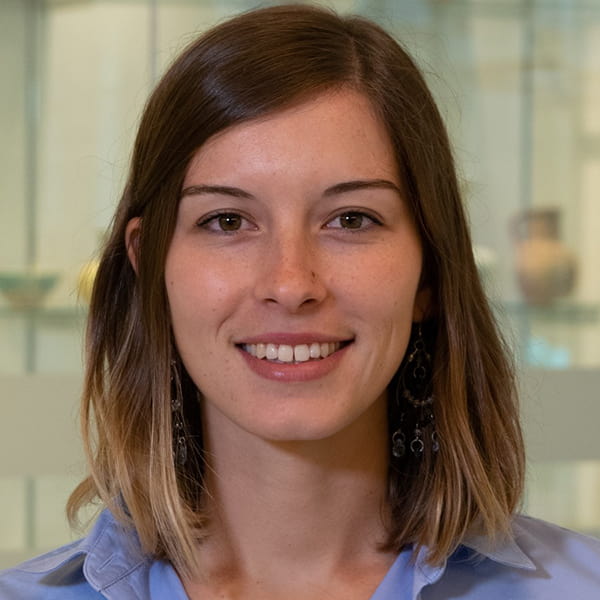
More about Aina
San Francisco Federal Reserve Board’s essay contest called for papers studying economic impacts of gender and racial inequalities. As a winner, Aina’s paper will be published in the Federal Reserve Board’s Economic Letter and will have the opportunity to participate in a 6-week summer research program.
Aina’s paper focused on the impact of monetary policy, through interest rates, on spending patterns among types of U.S. households—those with mortgages, those with women versus men as head of household, and those headed by White versus Black people. By building on her interest in macroeconomic inequality topics with direct policy implications, she intended (and continues to intend) to fill a gap in the literature, adding to the income inequality narrative by bringing gender and racial inequalities to the forefront of discussion.
Through this project, she was able to not only establish the impact of monetary policy shocks on consumption patterns, but also inform the Federal Reserve Board of these distributional impacts. When discussing her research, Aina states that “promoting equal opportunity and understanding the different impacts of policies can help policymakers create policies that promote economic growth while benefitting all groups’ well-being in society.”
Her interest in analyzing inequality topics through lens of distributional effects of macroeconomic policies came to life during her research for this paper and “ties directly into [her] plans for [her] dissertation…, a good starting point for [her] future research.”
Vasudeva Ramaswamy

More about Vasudeva
Economics PhD candidate Vasudeva Ramaswamy credits American University with helping him zero in on his area of research interest and for equipping him with the tools to explore and contribute to his field.
During his time at AU, Vasu spent two summers working with the World Bank, studying the impact of agricultural aggregators in East Africa — specifically, how they provided income and security to farmer communities.
Vasu’s dissertation considers the effects of the Federal Reserve Bank’s actions on household inequality. Who gains and who loses when the Fed increases (or decreases) interest rates? And how do these effects propagate through the economy? Because business income and profits play a key role in household inequality, Vasu looks at how businesses respond to the actions of the Fed.
After he earns his PhD, Vasu says he would love to be able to continue researching the importance of economic heterogeneity in monetary policy transmission. “I am particularly grateful for AU’s faculty, who are leading experts in their field and approachable and encouraging as mentors,” he adds. “I am equally grateful for the rest of my PhD cohort, who are a brilliant and motivated group. I am learning from them continually.”
Elissa Cohen
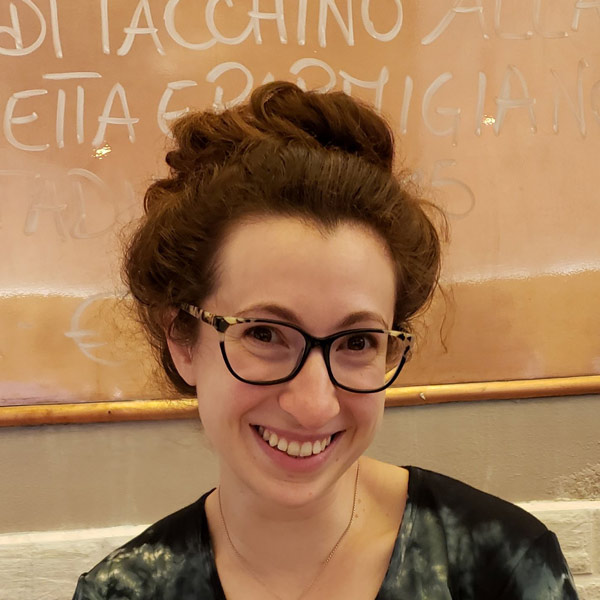

More about Elissa
Economics PhD candidate Elissa Cohen received an NSF grant to pursue her research about assumptions people make about risk and, building off an idea from a previous project, Elissa continues her interest in the Value of Statistical Life in this one to question the validity of how VSL is used and estimated. In doing so, she contributes to development of a more complete theory of how perceptions of risk guide decision making.
Elissa asks three questions: (1) Is the construct validity of the VSL consistent across measurement approaches? (2) Do people value the mitigation of varying types of fatality risk differently across domains? (3) Do people accurately comprehend the probability of death in a given setting?
To answer these questions, Elissa uses discrete choice experimental (DCE) designs, self-report surveys, and machine learning techniques to evaluate the validity of the VSL as an assessment how people’s risk assessment shapes behavior.
This research improves the understanding of how people perceive fatality risk across domains and how perceptions impact choices about risk exposure. With this research comes the potential to reshape how regulatory agencies construct their aggregated VSL estimates for future cost-benefit analyses, influencing policy decisions and allocation of scarce federal resources.
As she thinks about impact and the research space she can contribute to and develop, Elissa comments, “AU has definitely helped me refine the types of questions I am interested in answering…. I see myself continuing to explore and test feedback loops between emergent human behaviors and macro-level policy decision-making.”
Amy Burnett Cross
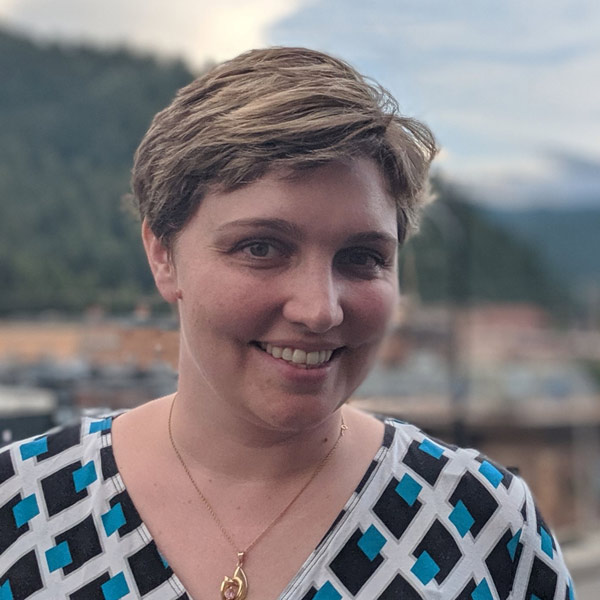
More about Amy
Amy Burnett Cross has been selected as one of the three NBER Pre-Doctoral Fellows in the Gender in the Economy program to support her dissertation research on the influence of military policy on the sorting of women into occupations. Through this research, she is able to include her knowledge from AU’s Program on Gender Analysis in Economics as well as her understanding that by bringing more insight from conservative institutions into her research realm, she could enhance the policy space of gender equity.
As she continues her career, Amy desires to conduct research that is directly applicable to policymakers, and through her research on this project, Amy has the chance to do this in addition to engaging with economic history and begin to invest more time in the historical arc of military policy and gender dynamics.
She has three focuses for her dissertation project: (1) evaluate the impact of lifting the ban on women in combat (in 2013) on civilian occupational desegregation; (2) measure the extent to which gender desegregation of the Army (in 1977) signaled a shift in the appropriate role of civilian women at work; and (3) assess whether the structure of the U.S. draft in WWI (in 1917) contributed to the development of the male breadwinner norm.
Amy’s work aims to provide evidence that policy changes can influence social norms constraining women’s work and occupational segregation, particularly in discovering how policies regarding women’s participation in the military go on to influence gender gaps in civilian labor market outcomes. In doing so, Amy also seeks to contribute to the research of information asymmetry as a cause for occupational segregation—does military gender desegregation function as a reduction of information asymmetry?
With the support and accommodation of her peers, professors, and advisor, Mary E. Hansen, Amy has been able to focus on her academic excellence and develop close friendships and bonds during her journey at AU. In discussing her work in gender economics and the community at American University, Amy offered, “AU attracts women economists and I have found some truly excellent ones here.”
Please send me information about PhD in Economics
It looks like you already used that name and address to request information for one or more AU graduate program(s).
If you have not previously requested AU graduate program information, create a new request
Doctoral Program
The Ph.D. program is a full time program leading to a Doctoral Degree in Economics. Students specialize in various fields within Economics by enrolling in field courses and attending field specific lunches and seminars. Students gain economic breadth by taking additional distribution courses outside of their selected fields of interest.
General requirements
Students are required to complete 1 quarter of teaching experience. Teaching experience includes teaching assistantships within the Economics department or another department .
University's residency requirement
135 units of full-tuition residency are required for PhD students. After that, a student should have completed all course work and must request Terminal Graduate Registration (TGR) status.
Department degree requirements and student checklist
1. core course requirement.
Required: Core Microeconomics (202-203-204) Core Macroeconomics (210-211-212) Econometrics (270-271-272). The Business School graduate microeconomics class series may be substituted for the Econ Micro Core. Students wishing to waive out of any of the first year core, based on previous coverage of at least 90% of the material, must submit a waiver request to the DGS at least two weeks prior to the start of the quarter. A separate waiver request must be submitted for each course you are requesting to waive. The waiver request must include a transcript and a syllabus from the prior course(s) taken.
2. Field Requirements
Required: Two of the Following Fields Chosen as Major Fields (click on link for specific field requirements). Field sequences must be passed with an overall grade average of B or better. Individual courses require a letter grade of B- or better to pass unless otherwise noted.
Research fields and field requirements :
- Behavioral & Experimental
- Development Economics
- Econometric Methods with Causal Inference
- Econometrics
- Economic History
- Environmental, Resource and Energy Economics
- Industrial Organization
- International Trade & Finance
- Labor Economics
- Market Design
- Microeconomic Theory
- Macroeconomics
- Political Economy
- Public Economics
3. Distribution
Required: Four other graduate-level courses must be completed. One of these must be from the area of economic history (unless that field has already been selected above). These courses must be distributed in such a way that at least two fields not selected above are represented. Distribution courses must be passed with a grade of B or better.
4. Field Seminars/Workshops
Required: Three quarters of two different field seminars or six quarters of the same field seminar from the list below.
Ph.D. Program
Make an impact: The intellectual rigor from researchers associated with Yale Economics drives innovations in domestic and international policy.

- Requirements
Yale's Department of Economics offers a challenging and rigorous academic program, a distinguished and accessible faculty, and a friendly, supportive environment for study.
Our core teaching faculty of 66 is supported by a diverse group of visiting professors and graduate student teaching assistants, making it one of the largest economics departments in the United States with one of the highest teacher/student ratios for the 130 Ph.D. students in residence.
The Department of Economics also has close ties with professional schools in related fields, such as the Yale School of Management, the Yale School of the Environment, and the Yale School of Public Health, where many of its secondary faculty members teach. It also works with affiliated centers, including the Cowles Foundation for Research in Economics, the Economic Growth Center, and the newly created Tobin Center for Economic Policy .
- The Program
- Prospective Students
- Milestones and Timeline
- Student Resources
- Student Directory
Our Program
Yale's economics faculty embraces a broad range of research and teaching interests. Courses and seminars span a wide spectrum of economics, from dynamic structural models to field experiments. Our students apply econometric and data analytic methods to a variety of subjects in macroeconomics, labor economics and finance. Our courses examine critical economic policy issues, including antitrust and environmental regulation. Our focus is global, spanning the United States and developed economies to the developing nations of Latin America, Asia and Africa. Whatever your interest, our faculty is ready to guide you through a wide offering of more than a hundred regular courses, seminars or workshops, combined with individually tailored reading and research courses to best prepare you for your Ph.D. research and dissertation.
Our faculty is eclectic in methodologies and views of economics. There is no Yale dogma or school. You will acquire a critical perspective on the full range of approaches to macroeconomics. You will be well trained in neoclassical theory and in the theory of public choice, externalities and market failures. You will master the skills of sophisticated modern econometrics and understand pitfalls in its applications. You will gain respect for the power of contemporary mathematical models and also for history and for the insights of the great economists of the past.

Fields of Study
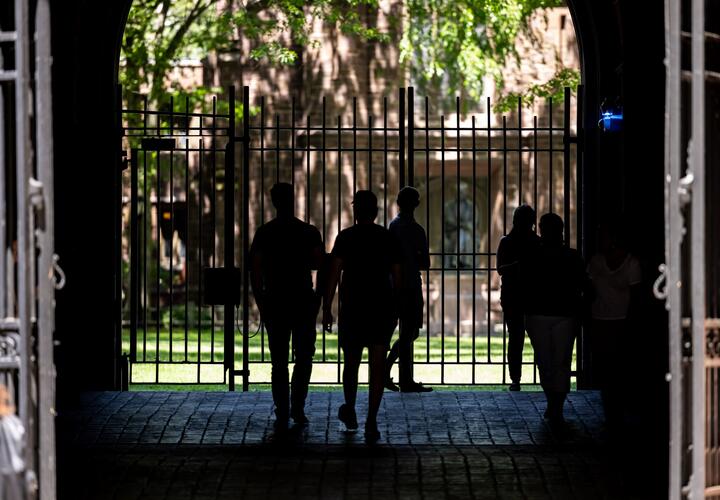

- Programs Overview
- Joint Finance PhD Program
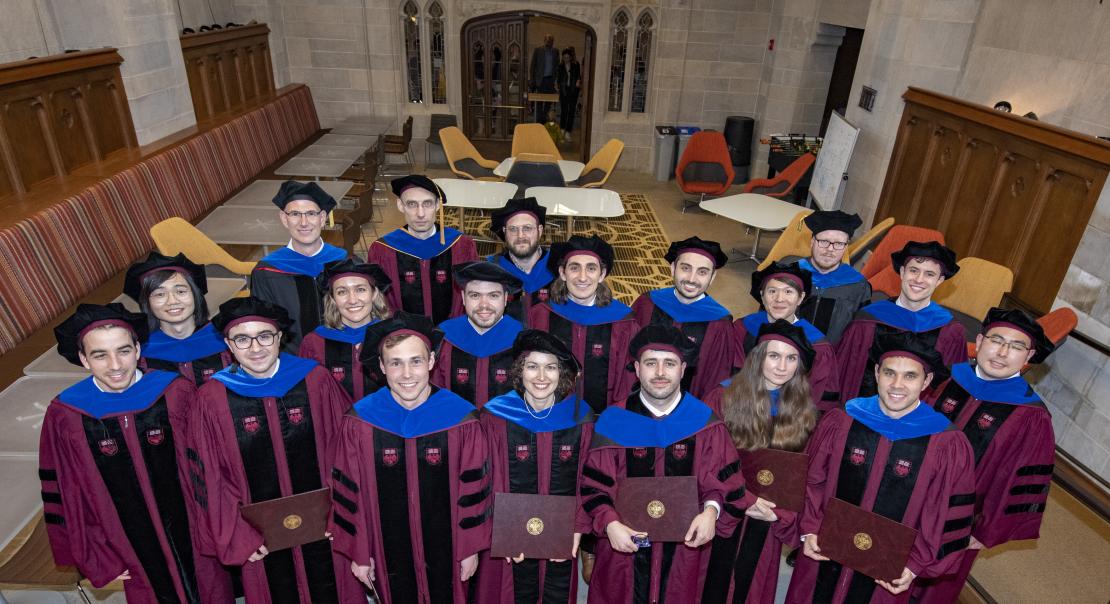
Joe Sterbenc
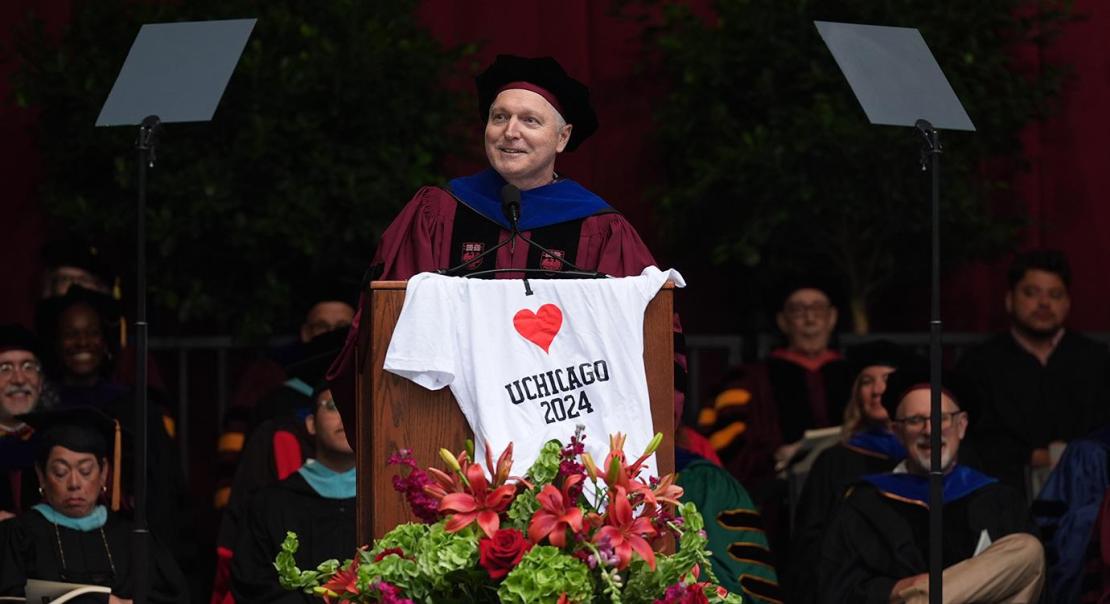
The Kenneth C. Griffin Department of Economics is one of the world's foremost economics departments, and its faculty are renowned for their seminal contributions to the field, achievements recognized with numerous Nobel Prizes, Clark Medals, and other distinctions. Students admitted to doctoral studies research, interact daily with the faculty, as well as fellow graduate students, and pursue their own interests, thus furthering their own scholarship and research, ultimately continuing to shape the discipline itself.
The Department of Economics receives 600-700 applications for an entering class of 20-25 students per year. The number of well-qualified applicants exceeds the number of offers we can make. Nevertheless, we still strongly encourage those interested in graduate economic study to apply.
_______________________________________________________________________
Sofia Shchukina, Department PhD Student, Awarded Funding through UChicago GRAD PhD Advance Program
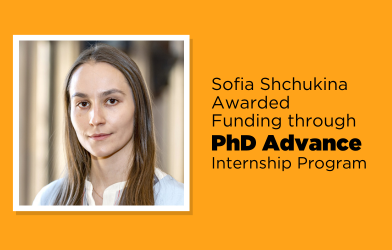
Sofia Shchukina, a PhD student in the Kenneth C. Griffin Department of Economics, was awarded funding for the 2023-24 academic year as part of UChicagoGRAD's PhD Advance internship program for her work with NPR's Planet Money.
The PhD Advance program supports students in building new skills and applying their advanced-degree training in an area of professional interest in academia, industry, nonprofits, or government. The internships are student driven and engage students’ academic work. With coaching from UChicagoGRAD, PhD students create their own projects based on their specific interests and needs. They receive a $6,000 stipend for an internship lasting 300 hours. The PhD Advance program prioritizes applicants who design customized, project-based internships. Project-based internships are those that engage the intern in a coherent set of responsibilities that progressively build toward a specific deliverable or outcome. Internships involving unrelated, ad-hoc tasks are not considered project-based opportunities. The program also gives preference to internship projects at organizations at which the applicant has no previous affiliation.
For more information about the program and to apply, visit grad.uchicago.edu .
Welcome incoming Ph.D. students! (alphabetical listing): Hazal Basaran; Connor Brennan; Joseph Campbell; Seamus Duffy; Sebastian Freed Huici; Alfonso Gauna; Javiera Gazmuri; Ariel Goldszmidt; Maria Del Mar Gomez Ortiz; Jiesheng Hong; Reigner Kane; Hanvit Kim; Philipp Kropp; Neel Lahiri; Yier Ling; Ayman Moazzam; Matthew Neils; Kyunghee Oh; Laura Pittalis; Jose Rishmawi; Amy Smaldone; Marco Spinelli; Rathan Sudheer; Yifan Wang; Shengning Zhang
Congratulations 2023-2024 Ph.D. Graduates! 2023-2024 PhD graduates (alphabetical listing): Scott Behmer • Maria Ignacia Cuevas de Saint • Santiago Franco • Zhiyu Fu • Michael Galperin • Shanon Hsu-Ming Hsu • Elena Istomina • Ihsan Furkan Kilic • Nadav Kunievsky • Marco Loseto • Nadia Lucas • Sangmin Oh • Aleksei Oskolkov • Estéfano Rubio • Francesco Ruggieri • Sidharth Sah • Marcos Gabriel Sorá • Michael Varley • Jingtao Zheng
_____________________________________________________________________________
Postdoctoral Program The Kenneth C. Griffin Department of Economics is proud to announce its first year (2023-24) of having a postdoctoral program!
Selected postdoctoral scholars in the program for 2023-24 are Harshil Sahai (PhD '23) and Esperanza Johnson Urrutia (PhD '23). Postdoctoral scholars in the program for 2024-25 are Elena Istomina and Shanon Hsuan-Ming Hsu.
STEM Eligibility The PhD program is STEM eligible for international students.
Divisional Graduate Resources
Find divisional Graduate Resources here.
The Economics PhD Program is administered by: Kathryn Falzareno Graduate Student Affairs Administrator SHFE 510 Phone: 773-702-3026 Email: [email protected]
PhD Admissions Application
This website uses cookies..
This website uses cookies to improve user experience. By using our website you consent to all cookies in accordance with our Cookie Policy.

IMAGES
COMMENTS
The Ph.D. Program in the Department of Economics at Harvard is addressed to students of high promise who wish to prepare themselves in teaching and research in academia or for responsible positions in government, research organizations, or business enterprises.
With a graduate degree in economics, students may find jobs as analysts and economists in the government, multinational corporations, higher education and business organizations. These are the...
The rigorous PhD economics program at Johns Hopkins is among the best in the nation. With its world-class faculty, individualized attention, and small classes, the doctoral program is the centerpiece of the Department of Economics.
Our doctoral program enrolls 20-24 full-time students each year and students complete their degree in five to six years. Students undertake core coursework in microeconomic theory, macroeconomics, and econometrics, and are expected to complete two major and two minor fields in economics.
Offering a combination of rigorous technical training and a focus on policy-relevant research, our PhD in Economics will prepare you for careers in academics, research, and government. Our students master economic theory, statistical methods, and applied field knowledge.
The Ph.D. program is a full time program leading to a Doctoral Degree in Economics. Students specialize in various fields within Economics by enrolling in field courses and attending field specific lunches and seminars.
From the effects of government regulation on economies to the impact of urban transit infrastructures, our PhD students examine a wide range of economic issues. When they graduate, they go on to positions at some of the top universities and companies in the world.
Our students apply econometric and data analytic methods to a variety of subjects in macroeconomics, labor economics and finance. Our courses examine critical economic policy issues, including antitrust and environmental regulation.
The Kenneth C. Griffin Department of Economics is one of the world's foremost economics departments, and its faculty are renowned for their seminal contributions to the field, achievements recognized with numerous Nobel Prizes, Clark Medals, and other distinctions.
Whether you’re looking to engage in innovative academic research or provide economic leadership in government and business, Fordham’s Ph.D. program in economics will give you the specialized training you need to make a direct impact on the world.